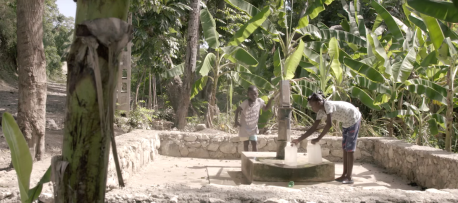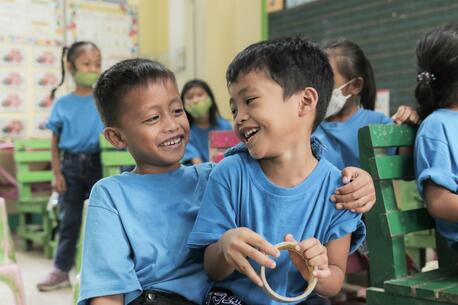
Our Hero: My Name Is Rosemaine Jean
Rosemaine Jean is a 12-year-old girl in Brésilienne, Haiti. She first heard of cholera on the radio. Then it struck closer to home.
Rosemaine's 13-year-old brother Alexis got cholera. "He washed his hands with dirty water, and then ate with them," she explains. During a weeklong stay in a medical clinic, Alexis nearly died.
After watching her brother suffer, Rosemaine took it upon herself to learn how to treat her family's well water with UNICEF-provided purification tablets, and how to properly wash their water jugs, food and clothes. This way, she has helped keep herself and her eight brothers and two sisters disease-free. Knowledge isn't all Rosmaine gained — she also gained inspiration. "I'd like to become a nurse, too, after I finish school."
See Rosemaine tell her story here
Cholera and other waterborne illnesses persist in too many countries. Despite immense progress, there are still 663 million people who lack clean water to drink and 2.4 billion without adequate toilets and sinks. That's why UNICEF works in more than 100 countries to provide safe, clean water and improved sanitation. In Haiti, UNICEF rehabilitates water facilities, distributes sanitation kits and educates families about water safety.
Kids helping themselves
But children like Rosemaine are not waiting for someone to solve their problems. They're learning from teachers and nurses how to stay safe. They're taking their futures into their own hands. Rosemaine chooses to spend her free time making sweets from coconuts and almonds, selling them on the side of the street to pay her school fees. Rosemaine Jean may not see herself as a hero. But we do.
Want to help empower girls to change the world? Fix the Water Burden. Help UNICEF help girls and women around the world by providing easier access to safe water.
Learn more about UNICEF's effort to reach the poorest and most vulnerable with safe water today.
This short film was produced by UNICEFUSA in collaboration with UNICEF Haiti and Ciné Institute.
HOW TO HELP
There are many ways to make a difference
War, famine, poverty, natural disasters — threats to the world's children keep coming. But UNICEF won't stop working to keep children healthy and safe.
UNICEF works in over 190 countries and territories — more places than any other children's organization. UNICEF has the world's largest humanitarian warehouse and, when disaster strikes, can get supplies almost anywhere within 72 hours. Constantly innovating, always advocating for a better world for children, UNICEF works to ensure that every child can grow up healthy, educated, protected and respected.
Would you like to help give all children the opportunity to reach their full potential? There are many ways to get involved.





